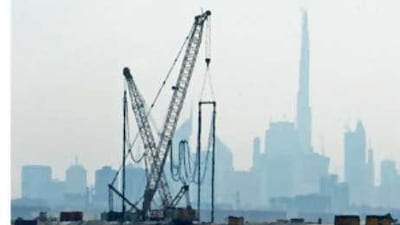The Palm Deira is on track and already three times larger in reclamation terms than its sister project, Palm Jumeirah, the Dubai developer in charge of the man-made islands project said yesterday after refuting media reports that it has been shelved. However, a senior executive acknowledged the company was cautious in its approach to completing the gigantic development. During a tour of the project, Khalid Dimas, the director of marine and infrastructure for Palm Deira, reeled off a list of statistics to reporters eager for an update on the progress of Nakheel's largest Palm island project. He said 1.2 billion cubic metres of sand would be reclaimed for the 42 million square metre development, while up to 4,000 construction workers - whose tasks vary from moving rock to building the nine power substations and a sales centre - descend on the site each day. But the statistic Mr Dimas is most proud of is that in terms of completed reclamation work, Palm Deira is the first of Nakheel's Palm trilogy. It will be almost eight times the size of Palm Jumeirah on completion. Nakheel is keen to quash speculation that the project has been seriously hit by the global credit crunch. Still, the company is being cautious in its approach to completing the works, with reclamation focused on the areas closest to Deira's shoreline in old Dubai, in preparation for the launch of land sales early next year. Reclamation work on the rest of the island, including its trunk and 12 fronds, is planned for completion before 2014, adding about a year to the original completion date. "We're not thinking about downsizing the project," said Abdulla bin Sulayem, the operations director for Palm Deira. "We've diverted our dredgers to reclaim areas nearest to the coastline. We need to have the portion closest to the city ready for construction." The developer is also keen to avoid the infrastructure problems that have blighted other major projects in Dubai, and work is progressing on bridges that will link the development with the mainland Deira area, as well as on the power substations. "The reason we can't start reclamation work on the other areas is because of the amount of infrastructure that needs to be in place," said Mr bin Sulayem. "It's easy for a developer to sell based on the idea of a project, but having utilities and infrastructure in place is very important for the project, which will give extra confidence to investors. We've spent months co-ordinating with the Dubai Roads & Transport Authority to provide the necessary infrastructure and utilities for the project. We want everything to be ready before we start selling." With those preparations in place, Nakheel plans to start selling land as part of the first phase of the development early next year, when Mr bin Sulayem expects liquidity in the market to be flowing again. "For all of Nakheel's projects, we're committed to achieving our objectives. The global credit crunch is like a cycle - it's something we're managing. We feel that by the first quarter of 2009 the market will start to pick up. For how long can banks stop lending?" Nakheel is also confident it will find buyers. "It's about getting infrastructure in place - we know the market wants this product," said Gavin Boyd, the director of development for Palm Deira. "There's no other waterfront project in Deira - we're just releasing the pressure on old Deira." Mr bin Sulayem added: "There's always demand for property in Dubai. When banks start lending, things will improve." Most of Palm Deira's construction will be done by sub-developers, while Nakheel will build on about 15 per cent of it. About 65 per cent of the project will be devoted to a mix of luxury and cheaper housing. There are also plans for a shopping mall, which will be "among the biggest in Dubai", as well as a hotel resort for which an operator will be announced this month. The beachfront on the island, known as Deira Front, will be open early next year, while the first residents are expected to move into their homes in 2011. Mr bin Sulayem said payment plans for the project had not changed, although the company may adjust terms to suit market conditions at the time the project was launched for sale. agiuffrida@thenational.ae

Palm Deira shrugs off gloomy property market
Nakheel will go ahead with the sale of part of the first phase of the Palm Deira, despite the gloomy international property market.
Most popular today
6
